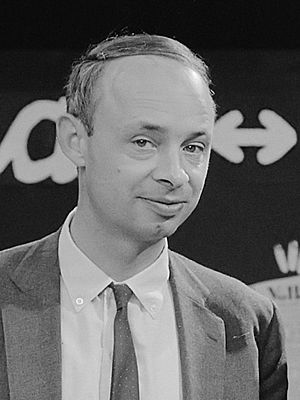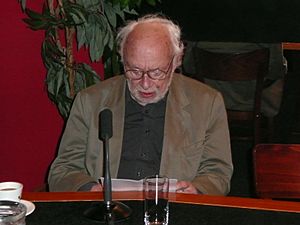Henk Hofland facts for kids
Quick facts for kids
Henk Hofland
|
|
|---|---|

Henk Hofland in 1964
|
|
| Born |
Hendrik Johannes Adrianus Hofland
20 July 1927 |
| Died | 21 June 2016 (aged 88) |
| Occupation | Journalist, columnist, essayist |
| Years active | 1953–2016 |
| Awards | P. C. Hooft Award (2011) |
Henk Hofland (born Hendrik Johannes Adrianus Hofland; 20 July 1927 – 21 June 2016) was a famous Dutch journalist. He was also a commentator, essayist, and columnist. People often called him "H.J.A. Hofland."
He was known as a very important and respected person in Dutch journalism. In 1999, other journalists voted him "Journalist of the Century" in the Netherlands. Henk Hofland once said he belonged to an "anarcho-liberal community." This means he had unique ideas about freedom and society. He was seen as a balanced thinker in the middle of society.
Contents
Henk Hofland's Early Life
Henk Hofland was born in Rotterdam, a city in the Netherlands. When he was 12 years old, he saw the city being bombed on 14 May 1940. This happened during the German invasion of the Netherlands. The bombing destroyed most of Rotterdam's center. About 900 people died, and 80,000 lost their homes.
This event deeply affected his life. He later said, "On 15 May, I woke up in a completely different world. It's an experience that stays with you forever." He felt that everything had changed.
In 1946, he started studying at Nyenrode Business University. He met Willem Oltmans there. However, Henk Hofland did not finish his studies.
Starting His Journalism Career
In 1950, Henk Hofland moved to Amsterdam. In 1953, he began his career as a journalist. He started working at the foreign news desk of a newspaper called Algemeen Handelsblad.
At the Handelsblad, Anton Constandse taught him about journalism. He worked with Hans van Mierlo and Jan Blokker. They became his lifelong friends. He also became friends with the famous author Harry Mulisch.
In October 1956, Hofland traveled to Budapest. A revolution was happening there against the Soviet Union's control. On 3 November, he heard Russian tanks arriving in the city. He saw the resistance fighters surrender. Hofland later said, "I knew that freedom had lost and that the West wouldn't help."
Becoming an Editor
In 1960, Henk Hofland was a junior foreign editor for the Handelsblad. He went to the United States as part of a program for foreign journalists. He took a journalism course at Pennsylvania State University. He also worked at a local newspaper in Johnstown, Pennsylvania.
He reported on the early elections for president in New Hampshire and West Virginia. He heard John F. Kennedy speak. Hofland remembered it as "flamboyant, unforgettable." He even shook Kennedy's hand, but he was too shy to ask a question.
In 1962, he became the deputy editor-in-chief of the Handelsblad. Then, in 1968, he became its editor-in-chief. In 1972, the Handelsblad merged with another newspaper. It became NRC Handelsblad.
Two years later, Hofland left his job. He had a disagreement with the newspaper's owner. The newspaper's writers had liberal views, but its readers were more conservative.
His Unique Journalism Style
After leaving his editor job, Henk Hofland continued to write. He published articles, essays, and reports for NRC Handelsblad as a freelance journalist.
In 1972, he published a book called Tegels Lichten (Lifting Tiles). This book contained essays about Dutch politics after World War II. It also covered important events like the end of Dutch rule in Indonesia. He wrote the book because he was frustrated with how Dutch authorities sometimes hid information.
Henk Hofland used a style similar to American New Journalism. This style often tells stories like a novel, with more personal feelings. In 1974, he made a TV documentary called Vastberaden, maar soepel en met mate (Determined, but flexible and cautious). He worked with Hans Keller and Hans Verhagen for the VPRO TV channel. Their documentary used a new way of telling stories and showed a strong interest in social issues.
Henk Hofland also wrote under the name Samuel Montag. This was a fake name he took from a British bank. As Samuel Montag, he wrote about everyday life. He often visited New York. He would express his frustration with modern things like advertising, changes in language, and too many cars. From 2002, he also wrote a column for the weekly magazine De Groene Amsterdammer.
His Legacy and Passing
Henk Hofland passed away in June 2016, at 88 years old. His columns and essays have been collected into about 30 books. He also wrote several novels and short stories. One of his favorite authors was the journalist Curzio Malaparte.
Awards and Recognition
Henk Hofland received many awards for his work:
- 1961 - Anne Frank Prize
- 1996 - Gouden Ganzenveer
- 1999 - Named ‘Dutch journalist of the century’ by other journalists.
- 2011 - P. C. Hooft Award, which is the highest literary award in the Netherlands. The judges praised Hofland for his easy writing style, strong work ethic, and balanced opinions. They said he had watched and understood Dutch society for sixty years with great care and fairness.
 | Kyle Baker |
 | Joseph Yoakum |
 | Laura Wheeler Waring |
 | Henry Ossawa Tanner |


